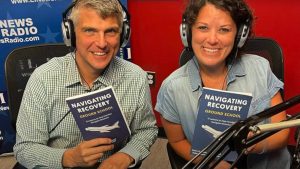
After the Intervention
When I do an intervention, I put my heart and soul into getting the appropriate care for person struggling with substance use. I was once there myself, after all. Before the intervention, I’ll spend a few days getting to know the person’s loved ones, and together we’ll research what insurance will pay for and select a facility best suited for the person’s needs.
Despite the work we do together, many interventions don’t result in the immediate decision to go to treatment. It’s likely that the struggling individual will put up roadblocks to leaving for the facility. Usually their excuses have something to do with work, childcare, vague appointments, or even just, “I don’t want to go today but I’ll go Thursday.” Before the intervention I will have worked with the family to remove the barriers to treatment, including arranging for childcare and any other obvious obstacles.
We have to prepare for the days following an intervention
Most of the time, the same thing happens. The person we intervened on will paint me as the enemy.
I had a difficult conversation with them about their drinking and drug use. The conversation was likely very painful for the person struggling with substance use, and it can be easier for them to convince themselves that I’m the bad guy than it is to look at the damage they’ve caused. Furthermore, the suffering person is an expert at manipulation. Thanks to their time using, they’ve been manipulating their family members for years. They know how to get people to cosign their addiction.
Next, the suffering person will try to form an alliance with family or friends, looking for the person they can bring to “their side.” Once a family member or friend relents, it can be very difficult to get back to the agreement that the person seek treatment. Sometimes it’s Dad that’s the softie; sometimes it’s Mom, and sometimes it’s a friend. The person struggling with substance will try to convince their target that treatment isn’t necessary, “It’s not that bad. I can change!” They make the interventionist a common enemy.
Making Excuses
Once the suffering individual has someone else on their side, the rest of the family and I will start hearing things like, “Dad doesn’t think I need to go” or “My wife says that I need to stay home and watch the kids.” The worst case scenario is that the cosigner joins with the suffering person and turns against the interventionist. This can be a powerful alliance. To break it, the interventionist must work with the cosigner to get them back on board with the recovery plan, and then go back to the suffering person.
Sometimes this isn’t possible. This alliance can completely erase the progress that the family and suffering person have made in the intervention and set the process back to square one, leading to many more months of addiction. In some cases, until another opportunity arises for recovery.
To avoid this situation, the family and friends of the person we intervened upon must beat the same drum, over and over again, until the person is safely in treatment. If there’s a plan in place for that person to go to treatment in a few days, loved ones must be ready for the calls, the manipulation, the attempts at alliances. Cosigning an excuse can turn “I’ll go on Monday” to “I’ll go next week” to not going at all.
Or – the POC Tries to Make this Go Away
Another common result of an intervention is for the person of concern to quit using “cold turkey.” In an effort to “prove us all wrong” or sweep the intervention under the rug, the PoC stops drinking, and will turn to us and say, “see, I can do this, you over-reacted.” Often we witness a PoC putting themselves in a dangerous situation of putting themselves though a difficult withdrawal.
Family members may observe that the PoC did put together a few days of sobriety, by force and begin to doubt the need for treatment. Hasn’t the family been here before? We know that the most difficult time to maintain sobriety is in the two weeks following detox. While the PoC might have put together a few days of sobriety, it is, most likely fleeting. If plans aren’t in place to support the individual though several weeks of emotional detoxification, this period of sobriety will end after the pressure is off, and the family will be right back to where they were.
Before the Intervention
Before the intervention, the family and I did a lot of work together to make a recovery plan, and to remove the barriers to treatment. Family and friends must be steadfast. They must stick to the plan. It’s possible to give loving, healthy support to a family member without agreeing to their manipulation attempts. Saying things like, “I love you, and you agreed to go on Thursday” or “I understand that you’re worried about the kids, as we discussed, we have a plan for their care so that you can go to treatment.”
The more time between the intervention and treatment, the more unmanageable the situation becomes. Reeling from the intervention, the person struggling with substance use will probably keep their use in check for a period of time, all while encouraging their loved ones to feel sorry for them or believe that this time may be different. The addiction no longer looks quite so serious. The plan to go to treatment is on the shelf. Loved ones forget about how bad it was just before the intervention, until the next blow-up.
Family members must stay on message, be aware that their loved one is trying to manipulate them, and be unwavering. After an intervention, family and friends need to stand strong.
About Adam Banks
Adam Banks is a certified interventionist and the owner of Adam Banks Recovery. After receiving an MBA from the University of Chicago, Adam built a company that was later acquired by United Health Care. His discipline and attention to detail comes from his former career as an airline pilot, holding an ATP, the FAA’s highest license.
Today, Adam is dedicated to helping others achieve long-term sobriety. His work has guided executives, pilots, and physicians on paths to recovery. Adam brings families together through a loving and inclusive approach.
Adam has authored four books on addiction. His recent work, Navigating Recovery Ground School: 12 Lessons to Help Families Navigate Recovery, educates families on the entire intervention process. He also offers a free video course for families considering an intervention for a loved one.
Adam is available for alcohol and drug intervention services in New York, Long Island, the Hamptons as well as nationally and internationally.




